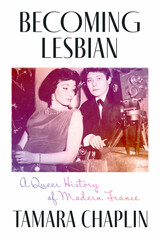
In Becoming Lesbian, historian Tamara Chaplin argues that the history of female same-sex intimacy in France is central to understanding the struggle to control the public sphere in the twentieth century. This monumental study draws on a wide range of undiscovered sources from cabaret culture, sexology, police files, radio and TV broadcasts, photography, the Minitel (an early form of internet), and private letters, as well as over one hundred interviews that Chaplin conducted with women from France and its colonies. Becoming Lesbian demonstrates how women of diverse classes and races came to define themselves as lesbian and used public spaces and public media to exert claims on the world around them in ways that made possible new forms of gendered and sexual citizenship. Chaplin begins in the sapphic cabarets of interwar Paris. These venues, as she shows, exploited female same-sex desire for profit while simultaneously launching an incipient queer female counterpublic. Refuting claims that World War II destroyed this female world, Chaplin reveals instead how sapphic subcultures flourished into the postwar period, laying crucial groundwork for the collective politicization of lesbian identity in the decades that followed.
Becoming Lesbian brims with colorful vignettes about female cabaret owners, singers, TV personalities, writers, and lesbian activists, all of whom Chaplin brings to life to make larger points about rights, belonging, and citizenship. As a history of lesbianism, this book represents a major contribution to modern French history, queer studies, and genealogies of the media and its publics.
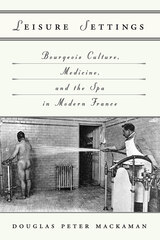
Taking us into the vibrant social world of France's great spas, Mackaman explores the links between class identity and vacationing. Mackaman shows how, after 1800, physicians and entrepreneurs zealously tried to break their milieu's strong association with aristocratic excess and indecency by promoting spas as a rational, ordered equivalent to the busy lives of the bourgeoisie. Rather than seeing leisure time as slothful, Mackaman argues, the bourgeoisie willingly became patients at spas and viewed this therapeutic vacation as a sensible, even productive, way of spending time. Mackaman analyzes this transformation, and ultimately shows how the premier vacation of an era made and was made by the bourgeoisie.
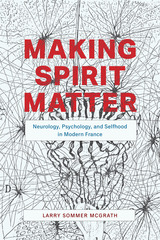
The connection between mind and brain has been one of the most persistent problems in modern Western thought; even recent advances in neuroscience haven’t been able to explain it satisfactorily. Historian Larry Sommer McGrath’s Making Spirit Matter studies how a particularly productive and influential group of nineteenth- and early twentieth-century French thinkers attempted to solve this puzzle by showing the mutual dependence of spirit and matter. The scientific revolution taking place at this point in history across disciplines, from biology to psychology and neurology, located our mental powers in the brain and offered a radical reformulation of the meaning of society, spirit, and the self. Tracing connections among thinkers such as Henri Bergson, Alfred Fouillée, Jean-Marie Guyau, and others, McGrath plots alternative intellectual movements that revived themes of creativity, time, and experience by applying the very sciences that seemed to undermine metaphysics and religion. Making Spirit Matter lays out the long legacy of this moment in the history of ideas and how it might renew our understanding of the relationship between mind and brain today.

Between the two World Wars, particularly in the 1930s, the relations between the French civilian government and the Army went through a series of devastating changes. These turbulent developments culminated in the refusal of the Army’s leaders to obey their civilian superiors during the catastrophe of June 1940, the first such insubordination in modern French republican history. The author examines every aspect of this disastrous process, pursuing his analysis largely through the activities and thought of General Maxime Weygand, who, although deeply affected by the loss of civil–military trust, contributed importantly to it and eventually led the Army in its disobedience.
Philip Bankwitz finds the seeds of the disaffection between the French civilian authorities and the military in a variety of interconnected elements. During the early 1930s, for example, the soldiers became convinced that the Government’s policies concerning service time, military appropriations, and disarmament were pushing the Army to the brink of ruin. The Third Republic was highly unstable politically, as was shockingly demonstrated in February 1934 when the Government leaders resigned in the face of violent disorders in Paris attendant on the Stavisky Affair which climaxed two years of internal strife. Among soldiers, aware of the Government’s weakness, suspicious of its alleged antimilitarism, and fearful of the approaching conflict with Nazi Germany, there was a growing and almost unconscious tendency to think in terms of the possible need to extend the protection of the Army to the nation in its difficulties. In this way, important elements in the officer corps began, psychologically and emotionally, “to prepare for eventual intervention in national political affairs.”
General Weygand, whom the author interviewed on numerous occasions, held the personal conviction that the distrust between the civilian and military establishments was the root cause of French defeat. Mr. Bankwitz is convinced that this opinion of Weygand’s is possibly the single most important clue to the puzzling connection between the civil–military relationship and the collapse of June 1940. Granting all the other factors contributing to the defeat, it would be impossible to exaggerate the historical importance of Weygand’s disobedience—an act which also opened the way for later military saviors and for the ascendant role of the Army in French politics.
This is the first scholarly study in depth of the crucial prewar phase of the French army’s development into a disruptive force in national life. A chapter from the portentous twentieth-century story of the soldier in politics, it has relevance now to situations already formed or forming in other western societies. The value of the book is greatly enhanced by an encyclopedic bibliography of writing on French political history in this century.
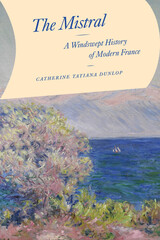
Every year, the chilly mistral wind blows through the Rhône valley of southern France, across the Camargue wetlands, and into the Mediterranean Sea. Most forceful when winter turns to spring, the wind knocks over trees, sweeps trains off their tracks, and destroys crops. Yet the mistral turns the sky clear and blue, as it often appears in depictions of Provence. The legendary wind is central to the area’s regional identity and has inspired artists and writers near and far for centuries.
This force of nature is the focus of Catherine Dunlop’s The Mistral, a wonderfully written examination of the power of the mistral wind, and in particular, the ways it challenged central tenets of nineteenth-century European society: order, mastery, and predictability. As Dunlop shows, while the modernizing state sought liberation from environmental realities through scientific advances, land modification, and other technological solutions, the wind blew on, literally crushing attempts at control, and becoming increasingly integral to regional feelings of place and community.
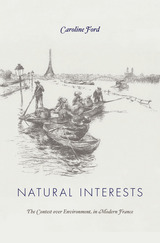
Challenging the conventional wisdom that French environmentalism can be dated only to the post-1945 period, Caroline Ford argues that a broadly shared environmental consciousness emerged in France much earlier. Natural Interests unearths the distinctive features of French environmentalism, in which a large and varied cast of social actors played a role. Besides scientific advances and colonial expansion, nostalgia for a vanishing pastoral countryside and anxiety over the pressing dangers of environmental degradation were important factors in the success of this movement.
Over the nineteenth and twentieth centuries, war, political upheaval, and natural disasters—especially the devastating floods of 1856 and 1910 in Paris—caused growing worry over the damage wrought by deforestation, urbanization, and industrialization. The natural world took on new value for France’s urban bourgeoisie, as both a site of aesthetic longing and a destination for tourism. Not only naturalists and scientists but politicians, engineers, writers, and painters took up environmental causes.
Imperialism and international dialogue were also instrumental in shaping environmental consciousness, as the unfamiliar climates of France’s overseas possessions changed perceptions of the natural world and influenced conservationist policies. By the early twentieth century, France had adopted innovative environmental legislation, created national and urban parks and nature reserves, and called for international cooperation on environmental questions.
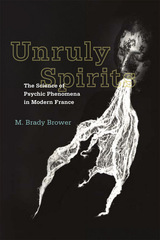
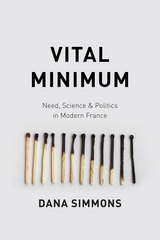
The result was the concept of the "vital minimum"--the living wage, a measure of physical and social needs. In this book, Dana Simmons traces the history of this concept, revealing the intersections between technologies of measurement, such as calorimeters and social surveys, and technologies of wages and welfare, such as minimum wages, poor aid, and welfare programs. In looking at how we define and measure need, Vital Minimum raises profound questions about the authority of nature and the nature of inequality.
READERS
Browse our collection.
PUBLISHERS
See BiblioVault's publisher services.
STUDENT SERVICES
Files for college accessibility offices.
UChicago Accessibility Resources
home | accessibility | search | about | contact us
BiblioVault ® 2001 - 2024
The University of Chicago Press









